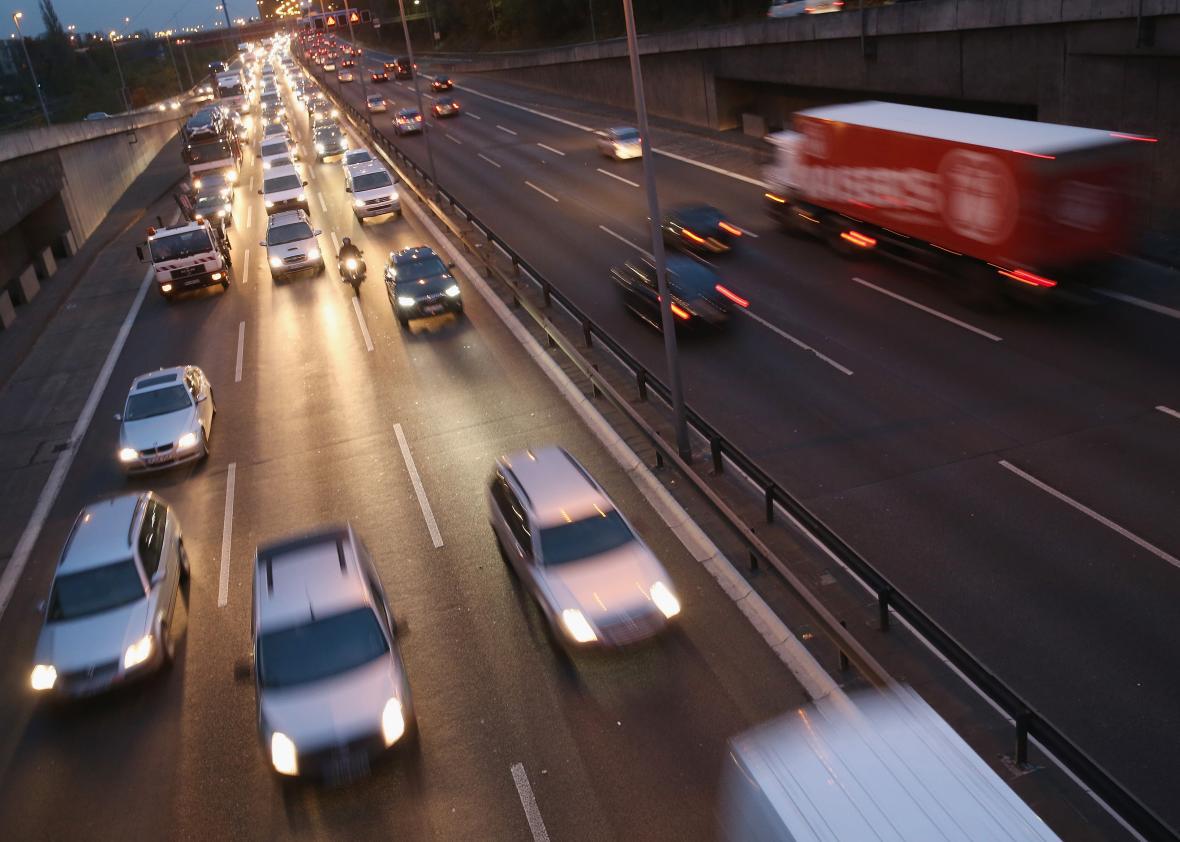A campaign is under way to ban the word accident from descriptions of car crashes. The New York City nonprofits Transportation Alternatives and Families for Safe Streets have teamed up to create a pledge, a hashtag, and a series of vigils reminding people that, while wrecks and injuries on the road may be unintentional, they are far from random, unpredictable, or unavoidable. “Accident is the transportation equivalent of ¯\_(ツ)_/¯,” explained Gizmodo last week, “immediately [exonerating] everyone involved.” But if you want to reduce the 30,000 or so automobile-related deaths that stain American roadways each year, you can take concrete steps: Don’t drive drunk. Obey traffic laws. Governments can focus on enforcing those laws, pushing for safe and effective street design, regulating vehicle licenses, and lowering the speed limit.
Advocates say the shift from accident to crash prevents negligent or reckless drivers from absolving themselves of responsibility. (There’s a reason 16-year-olds tell their parents they were “in an accident”—the construction demands the passive voice, and sounds antiseptically vague—rather than that they “totaled the van.”) According to Vox’s Joseph Stromberg, newspapers in the 1910s and ’20s tended to paint street collisions in lurid terms: Cars were a relatively new and threatening technology, and they emerged in the media (and in novels like The Great Gatsby) as dangerous villains, the murderous lackeys of the heedless rich.
But as vehicle ownership rose, automakers and other industry collectives gained power. They were able to agitate for new laws that limited the standing of pedestrians in court: Where once drivers were automatically blamed when casualties occurred, suddenly roads were considered to be “for cars,” and walkers imprudent interlopers. Manufacturers like Ford had already wised up to accident as the lawsuit equivalent of garlic breath on a date—during the Industrial Revolution, they learned to classify worker deaths as “accidents” to avoid the impression of fault. As the years cruised by, that precedent plus smart PR on the part of the auto-industrial complex—the National Automobile Chamber of Commerce even had its own wire service, in which wrecks were unfailingly described as bolts of bad luck—cemented the interchangeability of car crash and car accident.
It’s easy to see why accident caught on with the general public. Highway pileups can be shocking and graphic. (For proof of the elemental power of crumpled metal—call it the vehicular sublime—look no further than a Fast and Furious movie, or Mad Max.) The assertion that at least no harm was meant when one 2-ton chunk of speeding steel, iron, and glass wreaks havoc on another shrinks the destruction down to a manageable size. Maybe that’s the best argument for campaigns like Crash Not Accident: The more we use language to sugarcoat our terror of dying behind the wheel, the less action we’ll take to prevent automobile-related deaths.
That said, I don’t buy the argument that car accident is always an inaccurate phrase. Yes, sometimes an accident means an “event that happens unexpectedly, without a deliberate plan or cause.” (And yes, that definition jars when applied to crashes: One might reasonably “expect” vehicular mayhem to result if a driver is speeding and texting; one would certainly assign that mayhem a “cause.”) But the word can also simply describe “a happening that occurs unintentionally.” That seems to be the obvious spirit in which most traffic reports use accident today, and why not? Our justice system distinguishes between negligence and criminal intent for good reason. You could even assert that baked into the prevalence of accident is the fundamentally American idea of “innocent until proven guilty.” Ascribing bloodthirsty motives to a careless motorist feels as problematic as suggesting that she bears no responsibility for the pain she’s sown.
In classical philosophy, accidents are the opposite of occurrences that “happen without a cause.” In fact, they are precisely events that are contingent upon other events, rather than expressions of telos or inner nature. From that perspective, accident seems like the perfect word for a mishap that unfolds not necessarily from a person’s core being or values, but from his stupid lapse in judgment. (At the extreme edge of this claim lies drunk driving, which represents a choice and perhaps a deeper pathology.) You forgot to turn on your lights. No one repaired the pothole. These qualify as blameworthy errors with foreseeable consequences—exactly the sort of thing that might cause an accident.
